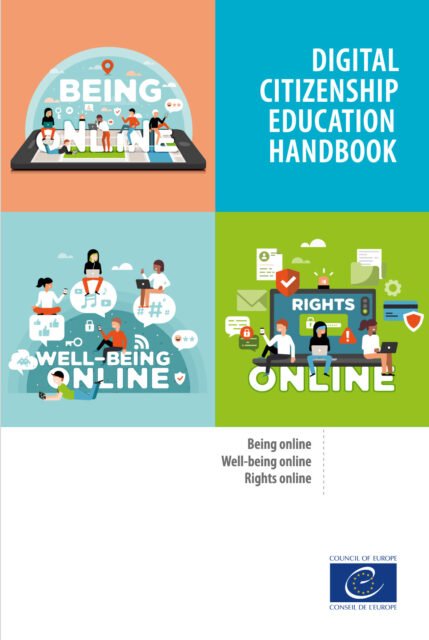screenshot from p17 Council of Europe’s Assessing Competences for Democratic Culture
The Council for Europe’s definition of Digital Citizenship is:
Competent and positive engagement with digital technologies…; participating actively and responsibly… in communities… at all levels…; being involved in a double process of lifelong learning… and continuously defending human dignity.
The European Digital Citizenship project states that young people should be supported to ‘participate safely, effectively, critically and responsibly in a world filled with social media and digital technologies’. Both definitions can be set in the context of the Competences for Democratic Culture which promotes specific values, attitudes, skills, knowledge and understanding for citizenship competences whether for engagement in digital or physical communities.
Digital Citizenship Education
The Digital Citizenship Education Handbook advocates that the process of developing children and young people as digital citizens should start as early as possible, and that it is the responsibility of all educators, whether formal, non-formal or informal, to be facilitating the development of the skills and competencies of being a digital citizen. This handbook focuses on 3 key themes that can also be used by educators to guide their work with young people on citizenship issues. These can be seen in the image below:

Being Online
This theme highlights:
- access and inclusion;
- learning and creativity;
- media and information literacy.
Young people can be facilitated to explore and understand issues of digital exclusion and how this impacts all citizens. Developing the skills and competencies of creative, agile and critical thinking ensures that young people are empowered to make informed choices about their participation and impact as digital citizens.
Wellbeing Online
This theme highlights:
- ethics and empathy;
- health and wellbeing;
- e-Presence and communications.
A good digital citizen takes part in digital life ethically and respectfully and this involves communication skills, understanding the impact of digital footprints/tattoos and how their online presence and behaviours might influence their own life and the lives of others, both positively and negatively.
Rights Online
This theme highlights:
- active participation;
- rights and responsibilities;
- privacy and security;
- consumer awareness.
Young people can be facilitated to consider their rights, obligations and roles as digital citizens. This includes areas such as freedom of expression/speech, rights, privacy, democratic participation and involvement, and legislation.





